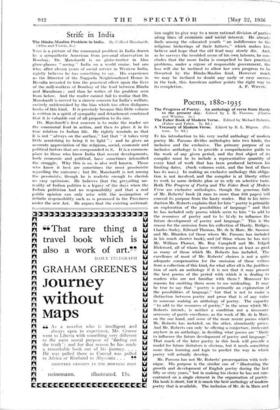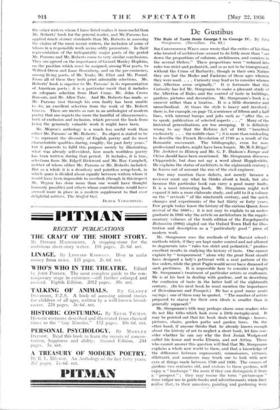Poems, 188o-1935
The Faber Book of Modern Verse. Edited by Michael Roberts. (Faber and Faber. 78. 64.) A Treasury of-Modern.-Verse. Edited by R.-L. Megroz. (Pit- man. 7s. 6d.)
Is his introduction to his very useful anthology of modern poetry Mr. Parsons divides anthologies into two kinds, the inclusive and the exclusive. The primary purpose of an inclusive anthology is to provide a comprehensive guide to the work of any given period, and the first object of: its compiler must be to include a representative quantity of
eyery kind of work that has been produced between his limiting dates. (Such volumes exist, and the best of them has its uses.) In making an exclusive anthology this obliga- tion is not involved, and the compiler is at liberty either to work to-some definite plan or to rely on' selective taste. Both The Progress of Poetry and The Faber Book of Modern Verse are exclusive anthologies, though the generous tiilk of Mr. Roberts' book (it runs to more than 350 pages) Will conceal its purpose from the hasty reader, But in his intro- duction Mr. Roberts explains that for him " poetry is primarily an exploration of the possibilities of language " and that
he has included only poems which seem to him " to add."-to the resources of poetry and to be 111.ely to influence, the future development of poetry and language." This is the reason for the omission from his collection of Hardy, Bridges, Charles Sorley, Edward Thomas, Mr. de la Mare, Mr. Sassoon and Mr. Blunden (of those whom Mr. Parsons has included in his much shorter book); and (of those whom he has not) Mr. William Plomer, Mr. Roy Campbell and Mr. Edgell Rickword, all of whom have written poems at least as good as many of those which Mr. Roberts has included. The excellence of most of Mr. Roberts' choices is not a quite adequate compensation for the omission of these writers from a collection of this kind, for what after all is the justifica- tion of such an anthology if it is not that it may present the best poems of the period with which it is dealing to readers who are not familiar with them ? Moreover his reasons for omitting them seem to me misleading. It may be true to say that " poetry is primarily an exploration of the possibilities of language," but that is not to makea distinction between poetry and prose that is of any Value to someone making an anthology of poetry. The capacity "to add to the resources of poetry," in the sense which Roberts intends, is neither. a condition nor a necessary accessory of poetic excellence, as the work of Mr. de la Mare, oh the one hand, and some of the more recent poems miiich Mr. Roberts has included, on the other, abundantly prciVe. And Mr. Roberts can only be offering a conjecture, irrelei'fint anyhow in an anthology, in deciding what poems are "likely to influence the future development of poetry and language." That much of the later poetry in this book will provide a niodel for future inntators is obvious, but it needs something more than learning and logic to predict the way in which poetry will actually develop.
Mr. Parsons has not Mr. Roberts' preoccupation with tech- nique. His purpose is the similar one of " illustrating the growth and development of English poetry during the last fifty or sixty years," but in making his choice he has not can- centrated on a single element in the organisation of poetry. His hoSek is-ahort; but it ig-mtiekille4ieit-mithology of mhdern poetry that is available. The inclusion of Mr. de la Mare and
the other writers whom I have listed makes it more useful than Mr. Roberts' book for the general reader, and Mr:Parsons has applied much sterner standards than Mr. Roberts in assessing the claims of the most recent writers, the inclusion of some of whom in a responsible work seems oddly premature. In their representation of the indisputably major poets of the period Mr. Parsons and Mi. Roberts come to very similar conclusions. They are agreed on the importance of Gerard Manley Hopkins, on the position which must'be assigned, among War poets, to Wilfred Owen and Isaac Rosenberg, and on the pre-eminence, among living poets, of Mr. Yeats, Mr. Eliot and Mr. Pound. Front all of these they both print admirable selections. Mr. Roberts' book is superior to Mr. Parsons' in its representation of American poets : it is a particular merit that it includes an adequate selection from Hart Crane, Mr. John Crowe Ransom, and Mr. Allen Tate. And Mr. Roberts has made, as Mr. Parsons (not through his own fault) has been unable to do, an excellent selection from the work of Mr. Robert Graves. These are merits so rare in an anthologist of modern poetry that one regrets the more the handful of idiosyncrasies, both of exclusion and inclusion, which prevent the book front being the genuinely valuable work it might have been.
Mr. Megroz's anthology is a much less useful work than either Mr. Parsons' or Mr. Roberts'. Its object is stated to be
to represent the diversity of English poetry and its most characteristic qualities during, roughly, the past forty years," but it proceeds to fulfil this purpose merely by illustrating, what was already self-evident, how much worthless poetry has been written during that period. It includes, it is true, selections from Mr. Edgell R ickword and Mr. Roy Campbell, neither of whom either Mr. Parsons or Mr. Roberts included. But as a whole it is a desultory and pointless scrap-book, in which space is divided about equally between writers whom it would have been impossible to overlook (though in this respect MT. Megroz has done more than one would have thought humanly possible) and others whose contributions would have seemed more in place in a modern supplement to that ever delightful sottisier, The Stuffed Owl.



















































 Previous page
Previous page